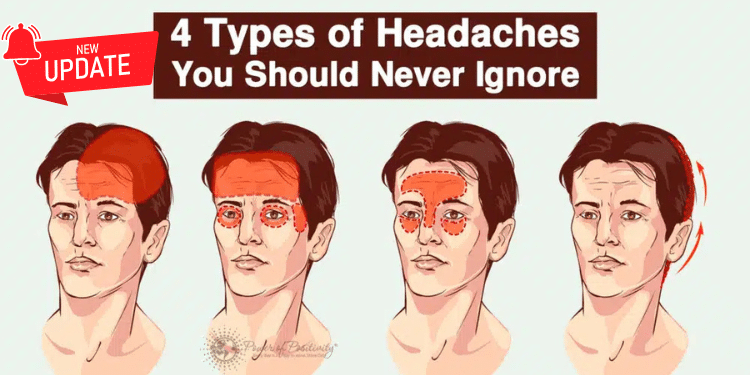Headaches are a common occurrence for many, often dismissed as a minor inconvenience or a result of stress.
However, not all headaches are created equal. Some may signal underlying health conditions that require immediate attention.
Knowing the difference between a typical headache and one that warrants medical evaluation can be life-saving.
Here are 4 types of headaches you should never ignore and what they might be trying to tell you about your health.
1. Thunderclap Headache
What It Feels Like:
A sudden, severe headache that peaks within seconds to a minute, often described as the “worst headache of your life.”
What It Could Mean:
- Subarachnoid Hemorrhage: Often caused by a ruptured brain aneurysm, this condition is life-threatening and requires immediate medical attention.
- Other Causes: Stroke, severe hypertension, or brain injury.
When to Act:
- Seek emergency medical care immediately if you experience a thunderclap headache, especially if it’s accompanied by nausea, vomiting, confusion, or loss of consciousness.
2. Headache with Neurological Symptoms
What It Feels Like:
A headache accompanied by vision changes, slurred speech, weakness or numbness on one side of the body, difficulty speaking, or confusion.
What It Could Mean:
- Stroke: A blood clot or bleeding in the brain can cause these symptoms along with a headache.
- Brain Tumor: Persistent headaches with neurological symptoms may indicate pressure on certain areas of the brain.
- Migraine with Aura: While not always life-threatening, migraines with aura can mimic the symptoms of a stroke.
When to Act:
- If these symptoms appear suddenly or worsen over time, call 911 or seek emergency care.
3. Headache After a Head Injury
What It Feels Like:
A headache that develops hours or days after a head injury, often accompanied by dizziness, confusion, or memory problems.
What It Could Mean:
- Concussion: Even mild head injuries can lead to concussions, causing lingering headaches and cognitive issues.
- Subdural Hematoma: A slow bleed between the brain and skull can occur days or weeks after trauma, potentially leading to life-threatening complications.
When to Act:
- If a headache persists or worsens after a head injury, or if it’s accompanied by symptoms like vomiting, drowsiness, or changes in behavior, seek medical attention immediately.
4. Chronic or Progressive Headache
What It Feels Like:
A headache that gradually worsens over time or becomes more frequent, often resistant to typical over-the-counter treatments.
What It Could Mean:
- Brain Tumor or Lesion: Progressive headaches could indicate increased pressure inside the skull.
- Infection: Conditions like meningitis or encephalitis can cause chronic headaches along with fever or neck stiffness.
- Hypertension: Severe high blood pressure can trigger persistent headaches, especially at the back of the head.
When to Act:
- Schedule a doctor’s visit if your headaches are becoming more frequent, persistent, or severe, or if they’re disrupting your daily life.
When to See a Doctor for Any Headache
While many headaches are harmless, you should seek medical advice if you experience:
- Headaches that wake you up at night.
- Sudden and severe headaches with no apparent cause.
- Persistent headaches that don’t respond to over-the-counter treatments.
- Headaches accompanied by fever, stiff neck, or sensitivity to light.
Headaches can be more than just a nuisance—they may be a sign of serious health issues.
Knowing when to seek medical attention can make all the difference. If you experience any of the headaches described above, don’t hesitate to consult a healthcare professional.
Share this article with friends and family – it could help someone recognize the warning signs of a dangerous headache and take action in time!
